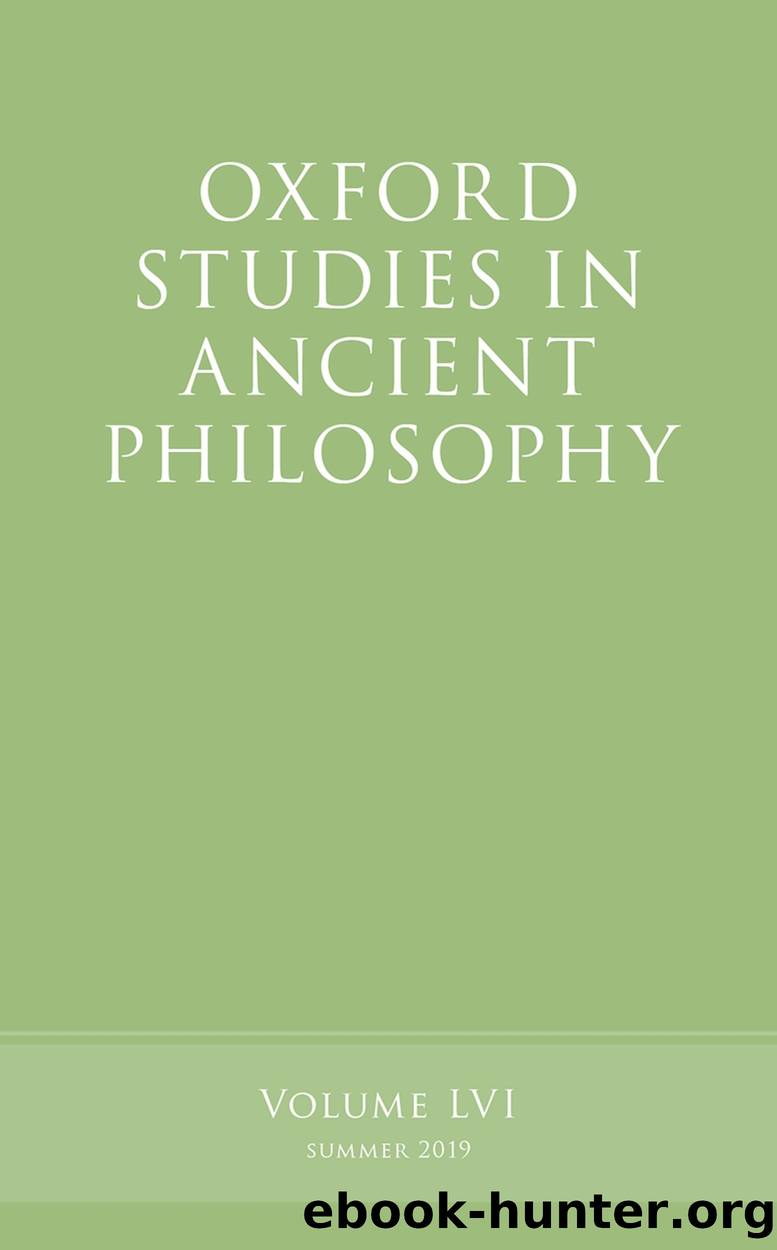Oxford Studies in Ancient Philosophy, Volume 56 by Victor Caston;

Author:Victor Caston; [Caston, Victor]
Language: eng
Format: epub
ISBN: 9780192591647
Publisher: OUP Premium
Published: 2019-10-18T00:00:00+00:00
5.3. âBeing-an-endâ as primary sense of energeia
Motion is energeia only in so far as it is on the way toward an end, but as only on the way, as incomplete in remaining merely capable, it is not energeia in the strict and unqualified sense. Substantial form is energeia in being an end, though it is an end relative to matter. An activity like seeing or thinking is energeia in the sense of possessing and indeed being its own end. If energeia is entelecheia,78 if having its end in itself and being âcompleteâ (teleion) is what is most essential to it, then the activities described in the Passage, to the extent that they are neither on the way toward the end like motion nor are ends for something else (like substantial form) but are their own ends, are energeia in the strictest, most unqualified sense and therefore help us understand the other analogous senses. The Passage is thus what transitions us from energeia in the sense of change to energeia in the sense of substantial form, as Frede thought, but not in the way in which he thought: not through some general schema of âactualityâ, but through the notion of being-an-end, and not by introducing yet another kind of energeia to be grouped with the others as all âactualâ or ârealâ, but by introducing what is energeia in the strictest sense because it is an end in itself and for itself.79 This connection between energeia and being-an-end is then assumed throughout the rest of Book Î, as is especially clear not only in the argument for the priority of energeia over dunamis in chapter 8, to be discussed below, but also in the assumption of chapter 9 that to speak of a bad energeia is to speak of a bad end: âIt is necessary in the case of bad things for the end and the energeia to be worse than the capacityâ (á¼Î½Î¬Î³ÎºÎ· δὲ καὶ á¼Ïὶ Ïῶν κακῶν Ïὸ ÏÎÎ»Î¿Ï ÎºÎ±á½¶ Ïὴν á¼Î½ÎÏγειαν εἶναι Ïεá¿Ïον Ïá¿Ï Î´Ï Î½Î¬Î¼ÎµÏÏ, 1051a15â16).
Download
This site does not store any files on its server. We only index and link to content provided by other sites. Please contact the content providers to delete copyright contents if any and email us, we'll remove relevant links or contents immediately.
Phoenicians among Others: Why Migrants Mattered in the Ancient Mediterranean by Denise Demetriou(564)
Verus Israel: Study of the Relations Between Christians and Jews in the Roman Empire, AD 135-425 by Marcel Simon(561)
Caesar Rules: The Emperor in the Changing Roman World (c. 50 BC â AD 565) by Olivier Hekster(541)
Europe, Strategy and Armed Forces by Sven Biscop Jo Coelmont(486)
Banned in the U.S.A. : A Reference Guide to Book Censorship in Schools and Public Libraries by Herbert N. Foerstel(457)
Give Me Liberty, Seventh Edition by Foner Eric & DuVal Kathleen & McGirr Lisa(456)
Reading Colonial Japan by Mason Michele;Lee Helen;(447)
The Roman World 44 BC-AD 180 by Martin Goodman(443)
american english file 1 student book 3rd edition by Unknown(442)
DS001-THE MAN OF BRONZE by J.R.A(432)
The Dangerous Life and Ideas of Diogenes the Cynic by Jean-Manuel Roubineau(423)
Introducing Christian Ethics by Samuel Wells and Ben Quash with Rebekah Eklund(419)
The Oxford History of World War II by Richard Overy(418)
Imperial Rome AD 193 - 284 by Ando Clifford(416)
Basic japanese A grammar and workbook by Unknown(415)
Literary Mathematics by Michael Gavin;(379)
Language Hacking Mandarin by Benny Lewis & Dr. Licheng Gu(356)
How to Reach the 9.0 in IELTS Academic Reading by IELTS Medical(340)
The Oxford History of the Renaissance by Campbell Gordon;(337)
